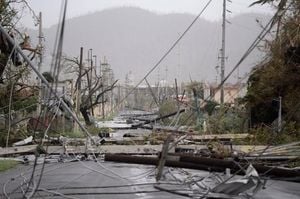On a crisp spring morning in western Massachusetts, what began as an ordinary day for J. and her family turned into a nightmare. As J. recounted to The Shoestring, one of her children ran into the room in a panic: masked immigration officers had just tackled her husband outside their home. "Mom, hurry up," her child pleaded. The officers, who refused to identify themselves, bundled her husband—an undocumented immigrant from Mexico—into a car and drove away, leaving J. and her children in tears and confusion. "I was left so confused, so lost in that moment because I didn’t know what would happen," J. remembered. Her only instinct was to shout for help, hoping someone had recorded the ordeal.
This scene, unfortunately, is not unique. According to The Shoestring, in May 2025 alone, Immigration and Customs Enforcement (ICE) arrested nearly 1,500 immigrants in Massachusetts. Eyewitness accounts and videos have surfaced showing agents in tactical gear arresting people at schools, courthouses, and on the street—sometimes smashing car windows or following parents as they drop off their children at school. The atmosphere in immigrant communities has grown thick with anxiety and dread.
Behind these high-profile arrests are policy shifts and political maneuvers that stretch from Florida to Washington, D.C. On August 15, 2025, The Floridian reported that the Republican Party of Florida, under Chairman Evan Power, was raising funds off Governor Ron DeSantis' 'Deportation Depot' initiative. Power, who has been credited with transforming the state party, has leaned into the hardline immigration stance that’s come to define much of the Republican platform in recent years. The fundraising effort is just one piece of a broader, national push for more aggressive immigration enforcement.
Earlier this summer, Republicans in Congress passed a sweeping budget bill that earmarked a staggering $170 billion over four years to ramp up immigration enforcement. As The Shoestring detailed, the funds will go toward hiring more agents, building additional detention facilities, and expanding the powers of ICE. The result? A modern record of about 60,000 immigrants currently in detention nationwide, with numbers expected to grow.
The scale of these efforts is unprecedented, but they don’t exist in a vacuum. Deportation has long been a tool wielded by both major parties. In fiscal year 2024, for example, President Joe Biden’s administration deported 271,000 immigrants—the highest number in the past decade, according to The Shoestring. Most of those removals followed arrests by border agents, but there’s a new emphasis on expanding operations deep into the country’s interior. Former President Donald Trump and his allies have promised to take these efforts even further, pledging mass deportations that dwarf previous records.
The impact on families and communities is profound. P., an undocumented farmworker from El Salvador who’s lived in the U.S. for over 20 years, described to The Shoestring the constant fear that now shadows daily life. "People are afraid to go to the store, to go wash their clothes," she said. Children, in particular, are traumatized by the threat of losing a parent. P. has made contingency plans for her own son, a U.S. citizen, in case she is detained: "I’ve left his documents with someone I trust who could take him to school or the doctor." Despite this, she dreads the idea of her son being sent to a country he’s never known.
Schools have become a barometer of this anxiety. Javier Luengo-Garrido, deputy field director for the ACLU of Massachusetts, told The Shoestring that educators are noticing a drop in attendance, especially among immigrant students. "What we’re hearing from teachers, from administrators, people who are really, really close to families… is that many times they are seeing a drop in attendance for students," he said. The superintendent of Berkshire Hills Regional School District confirmed to The Berkshire Eagle that fear of immigration enforcement has led to fewer children in classrooms. With the new school year approaching, J. shared, "there’s a lot of fear in sending children back to school."
Yet, amid the fear, immigrant communities are organizing. Mutual aid networks and legal-rights trainings have sprung up across western Massachusetts. The Pioneer Valley Workers Center, an immigrant-led collective, co-founded the LUCE Immigrant Justice Network, which operates a real-time hotline (617-370-5023) for reporting ICE sightings. "We were really clear that we needed to combat misinformation and get people real facts," a center representative told The Shoestring. LUCE has trained verifiers to confirm ICE activity, ensuring communities can make informed decisions about their safety within minutes. The center also helps families prepare for possible detentions, supports those searching for detained loved ones, and raises funds to assist separated families.
Local governments have also stepped in. Municipalities like Northampton and Springfield have passed ordinances limiting local cooperation with federal immigration authorities, aiming to create "safe city" environments. The idea, Luengo-Garrido explained, is to ensure immigrants feel comfortable reporting crimes or poor housing conditions. But he warned, "what’s happening now is people are really fearful to do those kinds of things." Survivors of domestic violence or sexual assault may hesitate to seek help, fearing police collaboration with ICE. "That’s highly concerning, and certainly this administration has made the immigrant community really fearful to engage."
The physicality and visibility of recent ICE operations have only heightened community anxiety. "The visibility and the way how this is happening in the middle of the day certainly generates fear among community members," Luengo-Garrido noted. Some believe these tactics are meant not only to catch individuals but also to send a chilling message to the broader immigrant population.
Despite the pervasive fear, resilience persists. P. emphasized that immigrants are essential workers, often doing jobs that others refuse. "We work so that you have your fruit and vegetables fresh on your tables, so your kids and you can have organic produce," she said. Behind every meal, she reminded, is a parent who wakes before dawn, works long hours in the fields, and sacrifices time with their children. "Take some time and read our stories," P. urged. "We didn’t come here to be enemies. On the contrary."
For families like J.’s, the trauma of separation lingers. After her husband was detained, she spent weeks in "survival mode," plagued by anxiety and nightmares. Even after his release, the fear never fully dissipates. "Although he’s not detained now, I’m always worried that they’re going to take him again—that immigration is going to arrive again," J. said. "You feel like you’re on their radar. They’re watching you and can show up whenever."
As the debate over immigration enforcement intensifies in Florida and beyond, the lived realities of those at the center of the storm remain complex, fraught, and deeply human. The road ahead, as J. put it, is still long, and for many, the struggle for safety and dignity continues every single day.




